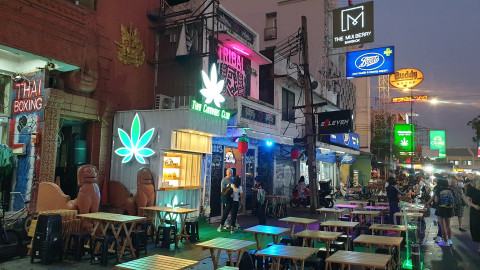Ideas into movement
Boost TNI's work
50 years. Hundreds of social struggles. Countless ideas turned into movement.
Support us as we celebrate our 50th anniversary in 2024.

Last year on 9 June 2022 the Thai government implemented what can be considered a u-turn in cannabis policy. After decades of strict control the government removed the cannabis plant from the list of controlled narcotics. The Minister of Public Health even handed out one million seedlings and encouraged people to grow cannabis at home. According to the Minister, this decriminalization of cannabis was soon to be supported by legislation and regulations that were yet to be finalised. The change in policy also resulted in the release from prison of over 4,000 people previously sentenced for cannabis related crimes. A very positive development.

Dominic Milton Trott/Flickr/CC BY 2.0 DEED - https://creativecommons.org/licenses/by/2.0/
The result of the policy change was immediately apparent in the streets of Thai cities, sometimes people even had a cannabis plant growing in the street in front of their house. But because this new policy was not yet supported by legislation something else happened too: the sudden appearance of cannabis shops everywhere. I remember buying some dimsum near the station in Chiang Mai in June 2022 and seeing that the stall also had ready-made joints on sale. Similarly in Bangkok, it didn't take long for cannabis shops to appear across the city offering a wide range of cannabis products.
Even though the new policy was initially mainly meant to support the medical, Thai-grown cannabis market, in practice recreational use of cannabis has been the main driver behind the fast growing market. Many shops have been set up with foreign investors, and are selling cannabis strains that don't grow in Thailand traditionally. At the same time over 1.1 million Thai people have registered to be licensed to grow cannabis. It is said that in some cases farmers of traditional crops like rice or maize have switched to cultivating cannabis because its profitable. Considering one gram of weed costs around USD13 on average in the dispensaries in Bangkok, it clearly is an enticing business. At the same time it is a price many locals cannot pay (minimum daily wage is 10 USD), thus the shops are obviously geared towards tourists and expats.
The Southeast Asian region is known for its strict drug laws and repressive policies. Drug related sentences can send people to prison for many years, even if they are caught with a small amount of drugs for personal use. It isn't surprising that the Thai move to decriminalise cannabis has been scrutinised by other countries in the region, and opinions vary also within Thailand. The recent elections in Thailand have returned the conservative Pheu Thai party to government. During their election campaign they already announced they would reschedule cannabis and enforce a strict control. The coming months will reveal what the new government will bring.
It is hoped the Thai change in cannabis policy will not back track. Two years ago the World Health Organisation reviewed the classification of cannabis in the UN drug control treaties and came to the conclusion the plant clearly has medicinal properties. Research comparing it to the harmfulness of other psychoactive substances has revealed that the use of cannabis is much less harmful than alcohol or tobacco. Uruguay, Canada, and several states in the US have fully regulated recreational use of cannabis, and contrary to what some people feared, the changes in their drug policies did not result in a massive increase of use among the local population. A certain level of regulation of the Thai cannabis market can help to increase support of the Thai people to the new policy. At the same time it should not be overlooked what the decriminalisation has meant to the thousands of people released from prison, and how cannabis could be a welcome source of income to the licensed farmers.
What would be the best way forward? Maybe the framework convention on tobacco control can serve as an example to regulate recreational cannabis use: no advertisement, promotion and sponsorship; clear information about harms and contents; no use for under 18s; protect people from exposure to smoke; taxation and licensed vendors. To protect the local farmers, international large cannabis corporations should be banned from accessing the market. From an environmental perspective it can also be argued that a preference should be given to the cultivation of local strains that can grow outside in the open air. Those strains have proven to be more sustainable, use less water, and are less vulnerable for pests and diseases. Besides the THC level of these local strains is a bit lower which is positive from a health point of view.
If Thailand manages to find a balanced, evidence-based, cannabis regulation model that allows people to enjoy the benefits of cannabis while avoiding the nuisance of an over-commercialised market, who knows, it may even set an example to other countries in the region.